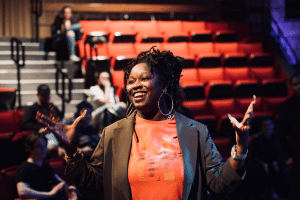Interview
Authenticity + Imagination
By: Claudie Benjamin, Guest Writer
JaMeeka Holloway is a passionate and the quintessential communicator. As theater director, she’s the kind of leader that engages her cast, inspiring them to connect enthusiastically with her vision. The bottom line here has three main components: bringing to life forgotten Black American historic heroes, telling a story related to Black history, “not only about Black People, but authentically conveys the multitudes of Blackness in a meaningful and exciting way.”
This means interpreting a script so that it rings true to people who have experienced themselves, or arrived through their cultural heritage at a heightened understanding of a specific historical context of the story.
More specifically, in the upcoming premiere on October 6th of Finding Freedom: The Journey of Robert Smalls, the context of Gullah culture comes through the guidance of Gullah Cultural Consultant Dr. Jessica Berry and, it’s even more complex than that. While Smalls was Gullah, many of those he interacted with in South Carolina of the mid to late 19th Century had different backgrounds. Holloway cares about authentically conveying these individuals as well..
However, it’s not all about replicating details of speech patterns, the creative interpretation of characters and their behaviors by each of the company’s actors matters too. The reimagined story has to feel real to a contemporary audience. Black history in the past was pretty much written by White men. Heroes were mostly male and most scenarios “were dehumanizing,” Holloway said.
In contrast Holloway has tailored the story, originally scripted by Teralyn Reiter, creatively to ensure that the role of the women as “agents of change” in Smalls’ life is underscored. “He heard his mother’s voice all his life. He was inspired by his mother and encouraged by his wife,” said Holloway. The play’s pivotal event involving the enslaved Small’s break to freedom for himself and his family occurred when he commandeered a Confederate ship steering it to Union territory. His wife was with him all the way in this extraordinarily brave act.
Holloway is thrilled that the play feels and sounds right and is convincing as an authentic interpretation of a historic event. The fact that she had never heard of Smalls although she was born, raised and educated in the South makes it important to tell a story she feels should be brought to the fore, enjoyed and remembered.
Holloway first learned about Small’s when being recruited by the Gaillard, to direct the play. She had recently been the director for a play about Mattie and Edward Berry, a Black couple “who made transformative changes in the hospitality industry in Ohio of the 1920s” Now, bringing forgotten heroes to light seems to be becoming a specialty. Understandably, with her particular interest in dramatizing Black history, she finds it especially exhilarating to be part of Gaillard’s first commission: an inspiring play specifically intended to highlight material relevant to Black and Indigenous people and People of Color. “It made me feel divine and alive to get the call from the Gaillard,” she said.

























